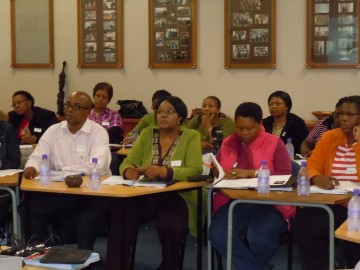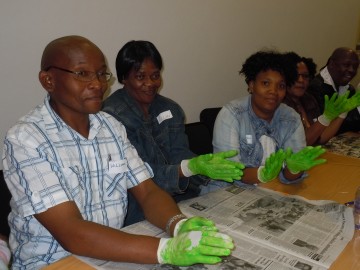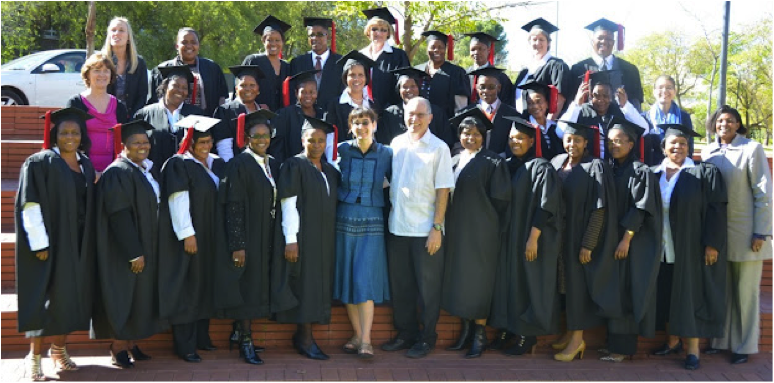Certificate Program in Implementation and Evaluation of Workplace-based Programmes for HIV and Tuberculosis Prevention and Care

Programme participants with students/mentors from the University of British Columbia, the International Labour Organization and the University of the Free State.
Dates:
February 2011 to July 2012Funded by:
International Development Research Centre, CanadaPartner Organizations:
University of the Free State (South Africa), Centre for Health Systems Research and Development (South Africa)There is increasing consensus that access to HIV and TB prevention, diagnosis, treatment, care and support can be provided at the workplace, provided that other aspects, particularly confidentially, can be strictly maintained. International efforts are underway to improve working conditions for health workers, including improving access of healthcare workers to HIV and TB prevention, treatment and care. Building capacity to design, implement and evaluate workplace-based interventions, especially among African healthcare workplaces in view of the scourge of HIV and drug-resistant TB is warranted. This programme is offered to meet this challenge.
4 days: April 12–15, 2011
The first of the three modules was introductory. It used a combination of presentations by experts (both from Canada and South Africa) as well as intensive, small group, problem-solving sessions, with a strong focus on building skills in addition to disseminating knowledge. The topics covered were:
- Basics of infection control (including exercises and the use of online learning modules
- Basics of occupational health
- International, national and provincial guidelines, legislation and policies regarding occupational health
- Basics of HIV and Tuberculosis transmission, prevention diagnosis, treatment, care and support
- HIV programs in the workplace
- Ethics regarding HIV and tuberculosis workplace-based research
- Research methods and tools
- Basic methods and framework for planning, implementing and evaluating programs
At the module’s end, the participants formed the groups (8) in which they worked to design, implement and evaluate workplace-based interventions over the course of the next 13 months.
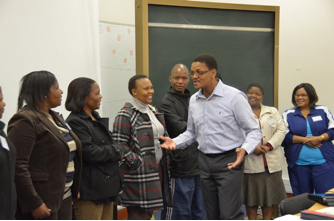
An exercise using the new WHO stigma toolkit lead by a colleague from the International Labour Organization.
4 days: September 6–9, 2011
In the second module, each of the 8 groups presented the preliminary version of their projects; these were then finalized over the four day period using capacity building techniques.
Participants acquired the skills to construct budgets, workplans, and timelines, using logic framework analysis techniques.
Mentors worked closely with the participants to develop the necessary tools for their projects (i.e. questionnaires, audit checklists, etc).

Sharing results of a problem-based learning activity focused on combating HIV stigma in the workplace.
2 days: May 15–16, 2012
In the third and final module, the contents and challenges of the course were summarized and the groups finalized their presentations. Particular attention was given by a panel to tuberculosis screening, diagnosis and treatment protocols for health workers and to HIV stigma, where Simphewi Mabhele, the HIV/TB Focal Point from the ILO, led his HIV Stigma tool kit exercise; a big success!

On 17 May, 2012, the accomplishments of the participants in the Certificate Programme were celebrated at a graduation ceremony. More than 100 guests, including representatives from the National Department of Public Service and Administration (DPSA), International Labour Organisation (ILO), National Institute for Occupational Health (NIOH), Free State Department of Health (FDoH), local labour organizations and academic departments attended the function.
The Certificate Programme participants, in their eight groups, presented their research findings.
The day concluded with closing remarks from Dr Sipho Senabe (DPSA) and Prof Christo Heunis (UFS).
Implementation and Evaluation of Workplace-Based Programmes for HIV and Tuberculosis Prevention and Care
May 17, 2012
Master of Ceremonies: Dr. Sipho Senabe, Chief Director: Employee Health and Wellness (Department of Public Service and Administration, South Africa)
8:30 Welcome messages
8:40 Background to the Certificate Programme
|
 |
8:50 Investigating TB infection control practices in the medical outpatient department at Pelonomi Hospital
|
 |
9:10 Improving infection control and safety practices in the Central Laundry: baseline assessment, intervention, and evaluation
|
 |
9:30 Improving reporting of blood and body fluid exposures in the workplace in Thebe District Hospital
|
 |
9:50 Establishing an effective system to prevent, identify and treat TB in employees at Universitas hospital
|
 |
|
10:10 General Discussion, Questions, Comments 10:30 Break 11:00 Reducing the risk of DOTS supporters acquiring TB during home visits in Bloemfontein and Welkom
|
 |
11:30 Improving utilization of workplace HIV/AIDS programme for healthcare workers at Pelonomi Hospital
|
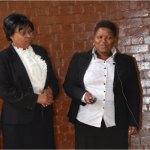 |
11:50 Creating a safe environment for patients and staff in the Bronchoscopy theatre at Universitas Academic Hospital
12:10 General Discussion, Questions, Comments 12:30 Presentation of the Certificates
|
 |
| 13:00 Catered lunch | |
|
14:00 Demonstration of the Occupational Health and Safety Information System (OHASIS)
14:20 Relevant ILO guidelines
|
 |
|
14:35 General Discussion, Questions, Comment 14:45 Presentation of evaluation of the programme
|
 |
|
15:00 Reflections on the course
15:10 Options and Opportunities for the next 5 years
15:30 Closing remarks
|
